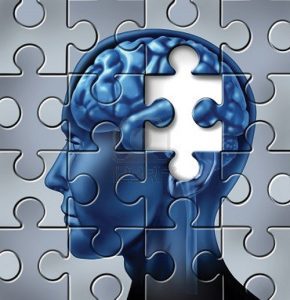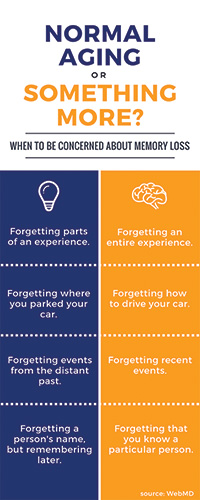November is National Alzheimer’s Month
 Alzheimer’s disease is a type of dementia that causes problems with memory, thinking and behavior. Symptoms usually develop slowly and get worse over time, becoming severe enough to interfere with daily tasks. Alzheimer’s is the most common cause of dementia, a general term for memory loss and other cognitive abilities serious enough to interfere with daily life. Alzheimer’s disease accounts for 60 percent to 80 percent of dementia cases.
Alzheimer’s disease is a type of dementia that causes problems with memory, thinking and behavior. Symptoms usually develop slowly and get worse over time, becoming severe enough to interfere with daily tasks. Alzheimer’s is the most common cause of dementia, a general term for memory loss and other cognitive abilities serious enough to interfere with daily life. Alzheimer’s disease accounts for 60 percent to 80 percent of dementia cases.
Currently, more than 110,000 people in Missouri are living with Alzheimer’s disease, and over 314,000 family and friends are providing care.
Alzheimer’s is not a normal part of aging. The greatest known risk factor is increasing age, and the majority of people with Alzheimer’s are 65 and older. But Alzheimer’s is not just a disease of old age. Approximately 200,000 Americans under the age of 65 have younger-onset Alzheimer’s disease (also known as early-onset Alzheimer’s).
Alzheimer’s is a progressive disease where dementia symptoms gradually worsen over a number of years. In its early stages, memory loss is mild, but with late-stage Alzheimer’s, individuals lose the ability to carry on a conversation and respond to their environment. Alzheimer’s is the sixth leading cause of death in the United States. On average, a person with Alzheimer’s lives four to eight years after diagnosis, but can live as long as 20 years, depending on other factors.
Alzheimer’s has no current cure, but treatments for symptoms are available and research continues. Although current Alzheimer’s treatments cannot stop Alzheimer’s from progressing, they can temporarily slow the worsening of dementia symptoms and improve quality of life for those with Alzheimer’s and their caregivers. Today, there is a worldwide effort under way to find better ways to treat the disease, delay its onset, and prevent it from developing.
10 WARNING SIGNS OF ALZHEIMER’S
 There are 10 warning signs and symptoms of Alzheimer’s. If you notice any of them, don’t ignore them. Schedule an appointment with your doctor.
There are 10 warning signs and symptoms of Alzheimer’s. If you notice any of them, don’t ignore them. Schedule an appointment with your doctor.
- Memory loss that disrupts daily life.
One of the most common signs of Alzheimer’s disease, especially in the early stage, is forgetting recently learned information. Others include forgetting important dates or events, asking the same questions over and over, and increasingly needing to rely on memory aids like notes or electronic devices, or family members for things they used to handle on their own. On the other hand, a typical age-related change is sometimes forgetting names or appointments, but remembering them later. - Challenges in planning or solving problems.
Some people living with dementia may experience changes in their ability to develop and follow a plan or work with numbers. They may have trouble following a familiar recipe or keeping track of monthly bills. They may have difficulty concentrating and take much longer to do things than they did before. - Difficulty completing familiar tasks.
People with Alzheimer’s often find it hard to complete daily tasks. Sometimes they may have trouble driving to a familiar location, organizing a grocery list or remembering the rules of a favorite game. - Confusion with time or place.
People living with Alzheimer’s can lose track of dates, seasons and the passage of time. They may have trouble understanding something if it is not happening immediately. Sometimes they may forget where they are or how they got there. - Difficulty with balance or trouble reading.
For some people, having vision problems is a sign of Alzheimer’s. This may lead to difficulty with keeping their balance or having trouble reading. They may also have problems judging distance and determining color or contrast, causing issues with driving. This is not related to natural vision changes like cataracts. - New problems with words in speaking or writing.
People living with Alzheimer’s may have trouble following or joining a conversation. They may stop in the middle of a conversation and have no idea how to continue or they may repeat themselves. They may struggle with vocabulary, have trouble naming a familiar object or use the wrong name like calling a wristwatch a “hand-clock.” - Misplacing things and losing the ability to retrace steps.
A person living with Alzheimer’s disease may put things in unusual places. They may lose things and be unable to go back over their steps to find them again. He or she may accuse others of stealing, especially as the disease progresses. - Decreased or poor judgment.
Individuals may experience changes in judgment or decision-making. For example, they may use poor judgment when dealing with money or pay less attention to grooming or keeping themselves clean. We all make a bad decision or mistake once in a while, like neglecting to change the oil in the car. - Withdrawal from work or social activities.
Because a person living with Alzheimer’s disease may experience changes in the ability to hold or follow a conversation, he or she may withdraw from hobbies, social activities or other engagements. They may have trouble keeping up with a favorite team or activity. - Changes in mood and personality.
Individuals living with Alzheimer’s may experience mood and personality changes. They can become confused, suspicious, depressed, fearful or anxious. They may be easily upset at home, with friends or when out of their comfort zone.
WHAT TO DO
If you notice any of the 10 warning signs of Alzheimer’s in yourself or someone you know, don’t ignore them. Schedule an appointment with your doctor. With early detection, you can explore treatments that may provide some relief of symptoms and help you maintain a level of independence longer, as well as increase your chances of participating in clinical drug trials that help advance research.
For more information and support groups visit www.alz.org/alzheimers-dementia or call the national Alzheimer’s 24/7 help line at 1-800-272-3900.
Serving 86 counties in Missouri and 10 in Illinois, the Alzheimer’s Association Greater Missouri Chapter provides education and support to all those facing Alzheimer’s and other dementias, including those living with the disease, caregivers, health care professionals and families. The St. Louis office is located at 9370 Olive Blvd, 63132.


